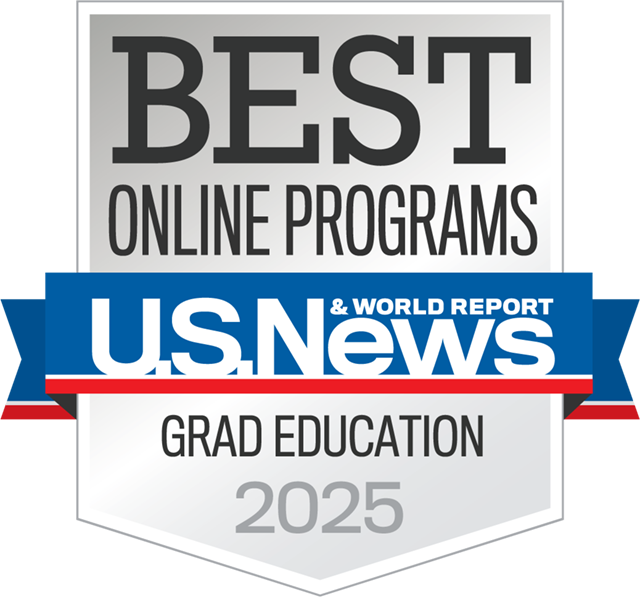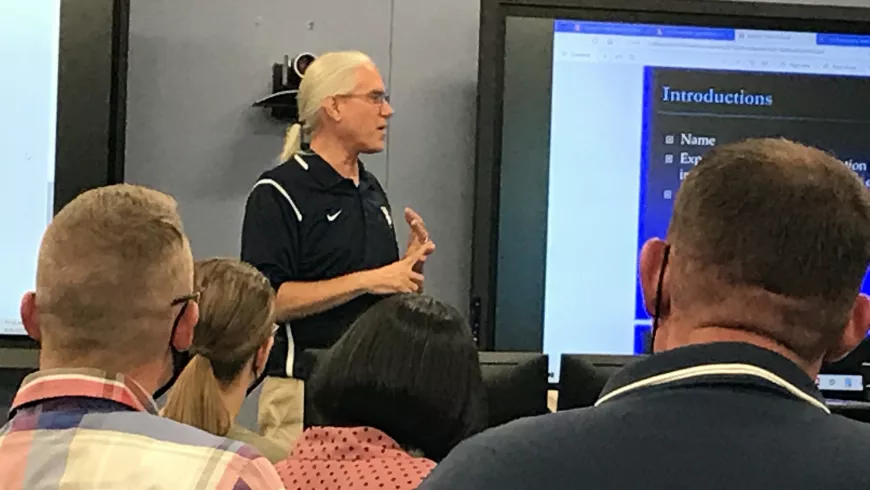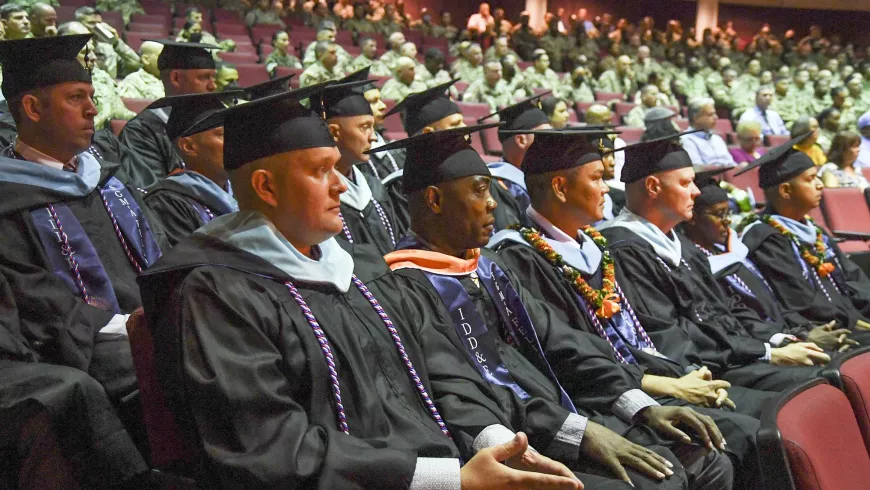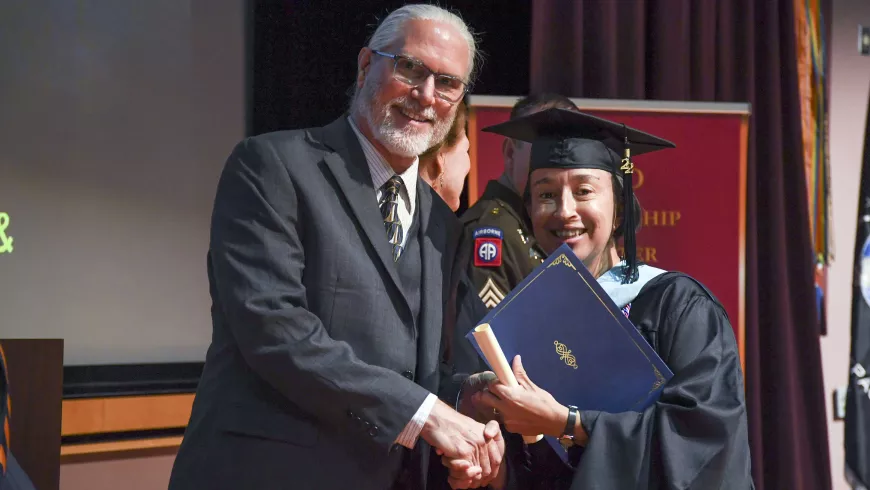100% Online
Complete your Penn State course work at your own pace and 100% online.
Application deadline
Credits and costs
Nationally Recognized

Develop Skills to Provide Leadership in Adult Education
Master techniques to effectively teach adult learners.
Cultivate adult education curriculum and instructional design and development.
Enrich program planning and administration for adult learners.
Enhance curriculum and/or program evaluation within adult education programming.
Courses to Prepare You to Teach Adult Learners
Courses to Prepare You to Teach Adult Learners
The 30 credits required in this degree program can give you the knowledge and skills required to work with adult learners. Each course focuses on preparing you to help adult learners build on their existing knowledge and continue to learn in a purposeful way.
The J. Jeffrey and Ann Marie Fox Graduate School policy requires that out of the 30-credit curriculum, at least 6 credits must be taken at the 500 level, and at least 18 credits must be taken at the 500 or 800 level. A maximum of 10 credits from graduate course work completed at an external institution may be transferred into a degree program. The Fox Graduate School also requires all students to graduate with a 3.0 GPA or higher and within an eight-year time frame.
Elective credits can be taken at any time during your degree progression. You will need to obtain prior approval from your academic adviser before taking any 400- or 500-level graduate courses to fulfill your elective requirements. Any graduate-level course taken at Penn State may qualify as an elective requirement for this program with prior approval from your academic adviser. You may also be able to transfer credits into the program, in consultation with your academic adviser. Prerequisites as listed may be waived by the course instructor if you can demonstrate the required level of competency.
Collaborative Experience, Practical Applications
The adult education curriculum uses a blend of web technology, print, and other media to maximize flexibility without sacrificing professor and student interaction. Communication tools, including bulletin boards and email, are used to foster a collaborative environment, providing you with the opportunity to learn from one another about the unique industries and institutions you come from and your varied professional experiences.
The curriculum and course format will help you develop practical applications of the topics you study. Learn online when it is convenient for you, and immediately apply to your job what you've learned.
Required Courses (12 credits)
The core courses and culminating experience are required for all program options.
Core Courses (9 credits)
- 3credits
History, methods, agencies, program areas, and problems of adult education in the United States.
- 3credits
Examination of direct and indirect teaching; contracts, application of current technology, andragogy, motivation, evaluation; knowledge of research.
- Prerequisite
ADTED 460
- 3credits
Introduction to adult education learning theory, principles, and models of adult learning by adults alone, in groups, and in communities.
Culminating Experience (3 credits)
- 3credits
Review of research in adult education, current and past, with analysis of its directions, effects, methodology, quality, financing, and prospects. This is the capstone course — all other required courses must be taken prior to ADTED 588.
Option Courses (select 18 credits)
Students will select 18 credits from one of the available options:
General Master of Education Option (select 18 credits)
- 3credits
An introduction to the history, philosophy, organizations, learning theories, and instructional procedures used in American and foreign distance education.
- 3credits
This course provides an overview of medical education and considers how it operates as a specific form of adult education. It is especially relevant to educators working with adult learners in medical education, nursing education, or health education.
- 3credits
This course focuses on program planning and instructional design in a medical setting with an emphasis on teaching with simulation.
- Prerequisite
ADTED 460
- 3credits
Intensive study of theoretical foundations, policies, evaluation models, methods, and materials in program planning in adult education.
- Prerequisite
ADTED 460, ADTED 505
- 3credits
Guided discussion and reading in selected research and evaluation methods and trends as applied in adult education settings.
- Prerequisite
ADTED 460
- 3credits
Examines the relationship between issues of language, identity, and culture for adult learners in an increasingly global context.
- Prerequisite
ADTED 508
- 3credits
Social and historical foundations of adult education in the United States and selected nations.
- Prerequisite
ADTED 460
- Note
Students must have completed at least 12 credits of related course work prior to taking this course.
- 3credits
Students will explore the historical and current developments of online and distance education in different regions of the world.
- Prerequisite
ADTED 460
- 3credits
Organization of a program of adult education; legal status, finances, selection of teachers, learning personnel, housing; other administrative problems.
- Prerequisite
ADTED 506 or EDLDR 480
- 3credits
In-depth coverage of social theory, especially as it intersects with research in adult education and lifelong learning.
Required Courses (12 credits)
- 3credits
An introduction to the history, philosophy, organizations, learning theories, and instructional procedures used in American and foreign distance education.
- 3credits
In-depth study of the practices of designing courses taught by print, broadcast, and telecommunications media to adult distance learners.
- Prerequisite
ADTED 470, LDT 415A
- 3credits
Study of previous, current, and needed research, and of strategies and issues concerning evaluation, in distance education.
- 3credits
Students will explore the historical and current developments of online and distance education in different regions of the world.
- Prerequisite
ADTED 460
Electives (select 6 credits)
- 3credits
History, methods, agencies, program areas, and problems of adult education in the United States.
- 3credits
Intensive study of theoretical foundations, policies, evaluation models, methods, and materials in program planning in adult education.
- Prerequisite
ADTED 460, ADTED 505
- 3credits
Social and historical foundations of adult education in the United States and selected nations.
- Prerequisite
ADTED 460
- Note
Students must have completed at least 12 credits of related course work prior to taking this course.
- 3credits
Organization of a program of adult education; legal status, finances, selection of teachers, learning personnel, housing; other administrative problems.
- Prerequisite
ADTED 506 or EDLDR 480
- 3credits
In-depth coverage of social theory, especially as it intersects with research in adult education and lifelong learning.
- 3credits
This course examines emerging web technologies and explores their application to learning and education.
Course Availability
If you're ready to see when your courses will be offered, visit our public LionPATH course search (opens in new window) to start planning ahead.
Excel in the Adult Education Field

Excel in the Adult Education Field
Adult educators are in high demand. You can use the knowledge gained from this program and the support of Penn State career resources to pursue careers in a variety of fields, depending on your goals.
Job Titles Related to This Degree
The following roles are often held by people with this type of degree:
- Adult Basic Education Instructor (ABE Instructor)
- Education and Development Manager
- GED Instructor (General Educational Development Instructor)
- Learning and Development Director
Employment Outlook for Occupational Fields Related to This Degree
Estimates of employment growth and total employment are provided by the U.S. Bureau of Labor Statistics and are subject to change. While these occupations are often pursued by graduates with this degree, individual outcomes may vary depending on a variety of factors. Penn State World Campus cannot guarantee employment in a given occupation.
Training and Development Managers
Adult Basic Education, Adult Secondary Education, and English as a Second Language Instructors
Additional Job Fields and Opportunities
- Understand how to teach or train audiences with diverse backgrounds and learning styles.
- Effectively support corporate and organizational initiatives to develop essential training and professional development for employees.
- Meet the increasing demand of health care centers, community centers, higher education institutions, and corporate training centers in need of qualified adult educational professionals.
Career Services to Set You Up for Success

From the day you're accepted as a student, you can access resources and tools provided by Penn State World Campus Career Services to further your career. These resources are beneficial whether you're searching for a job or advancing in an established career.
- Opportunities to connect with employers
- Career counselor/coach support
- Occupation and salary information
- Internships
- Graduate school resources
Ready to Learn More?
Get the resources you need to make informed decisions about your education. Request information on this program and other programs of interest by completing this form.
Ready to take the next step toward your Penn State master's degree?
Costs and Financial Aid
Costs and Financial Aid
Learn about this program's tuition, fees, scholarship opportunities, grants, payment options, and military benefits.
Costs and Financial Aid
Graduate Tuition
Graduate tuition is calculated based on the number of credits for which you register. Tuition is due shortly after each semester begins and rates are assessed every semester of enrollment.
2025–26 Academic Year Rates
| How many credits do you plan to take per semester? | Cost |
|---|---|
| 11 or fewer | $1,037 per credit |
| 12 or more | $12,448 per semester |
Financial Aid and Military Benefits
Some students may qualify for financial aid. Take the time to research financial aid, scholarships, and payment options as you prepare to apply. Federal financial aid may only be used to pay for credits used to satisfy program requirements.
Military service members, veterans, and their spouses or dependents should explore these potential military education benefits and financial aid opportunities, as well.
Additional Cost of Attendance Details
To view the detailed list of cost of attendance elements:
- visit the Tuition Information site
- click the plus sign to expand the table
- select a semester from the World Campus row
Technical Requirements
Review the technical requirements for this program.
Earn a Valuable Credential along the Way

Earn a Valuable Credential along the Way
Show mastery of specific subjects before your degree is complete. Thanks to shared courses across programs, students can often earn a certificate along with their degree in less time than if they earned them separately.
Certificate Programs Related to This Degree
In addition to the master’s degree, Penn State offers online a related postbaccalaureate certificate. All the credits you earn in this certificate program may be applied toward the requirements for the Master of Education in Lifelong Learning and Adult Education, upon your acceptance into that adult education program.
The following certificate can be earned while completing this degree program:
Meet the rising demand for distance education professionals. This program — designed by the founding director of the American Center for the Study of Distance Education — focuses on adult education principles, distance learning course design, and research and evaluation in distance education.
Learn more about the Postbaccalaureate Certificate in Distance EducationCustomize Your Degree
Align your degree studies with your career goals by choosing the general master's in education path or selecting a formal option, which will appear on your diploma.
Offers flexibility to register for more electives from different areas, including global online and distance education and qualitative research methods.
Emphasizes historical and current procedures, practices, and developments related to distance education both domestically and internationally. Electives include course topics such as theory, program planning, and emerging technologies.
Who Should Apply?
This online program is ideal for:
- entry-level professionals in a variety of administrative areas
- those aspiring to become mid-level administrators of college and university offices
- practitioners in a variety of administrative functions desiring further professional development and career enhancement
Act 48 Approved
Penn State is an Act 48–approved provider for Pennsylvania educators, so the courses for the Master of Education in Lifelong Learning and Adult Education may count toward your professional development hours.
Set Your Own Pace

Set Your Own Pace
Whether you are looking to finish your program as quickly as possible or balance your studies with your busy life, Penn State World Campus can help you achieve your education goals. Many students take one or two courses per semester.
Our online courses typically follow a 12- to 15-week semester cycle, and there are three semesters per year (spring, summer, and fall). If you plan to take a heavy course load, you should expect your course work to be your primary focus and discuss your schedule with your academic adviser.
To Finish Your Degree in One to Two Years
- Take 3–4 courses each semester
To Finish Your Degree in Two to Three Years
- Take 2–3 courses each semester
To Finish Your Degree in Three to Four Years
- Take 1 course each semester
Timelines may vary based on course availability.
Convenient Online Format
This program's convenient online format gives you the flexibility you need to study around your busy schedule. You can skip the lengthy commute without sacrificing the quality of your education and prepare yourself for more rewarding career opportunities without leaving your home.
A Trusted Leader in Online Education

Penn State has a history of more than 100 years of distance education, and World Campus has been a leader in online learning for more than two decades. Our online learning environment offers the same quality education that our students experience on campus.
How to Apply to Penn State

How to Apply to Penn State
Apply by November 1 to start January 12
Application Instructions
Deadlines and Important Dates
Complete your application and submit all required materials by the appropriate deadline. Your deadline will depend on the semester you plan to start your courses.
Spring Deadline
Apply by November 1 to start January 12Summer Deadline
Apply by April 1, 2026, to start May 18, 2026Fall Deadline
Apply by July 1, 2026, to start August 24, 2026
Steps to Apply
For admission to the Fox Graduate School, an applicant must hold either (1) a baccalaureate degree from a regionally accredited U.S. institution or (2) a tertiary (postsecondary) degree that is deemed comparable to a four-year bachelor's degree from a regionally accredited U.S. institution. This degree must be from an officially recognized degree-granting institution in the country in which it operates.
GPA — All applicants are expected to have earned a junior/senior grade point average of 3.0 or higher.
You will need to upload the following items as part of your application:
Official transcripts from each institution attended, regardless of the number of credits or semesters completed. Transcripts not in English must be accompanied by a certified translation. If you are a Penn State alum, you do not need to request transcripts for credits earned at Penn State but must list Penn State as part of your academic history.
English Proficiency — The language of instruction at Penn State is English. With some exceptions, international applicants must take and submit scores for the Test of English as a Foreign Language (TOEFL) or International English Language Testing System (IELTS). Minimum test scores and exceptions are found in the English Proficiency section on the Fox Graduate School's "Requirements for Graduate Admission" page. Visit the TOEFL website for testing information. Penn State's institutional code is 2660.
References (3) — You will need to initiate the process through the online application by entering names, email addresses, and mailing addresses of three references. Upon submission of your application, an email will be sent to each reference requesting they complete a brief online recommendation regarding your commitment for success in an online program. Please inform all recommenders they must submit the form in order for your application to be complete.
Program-Specific Questions/Materials
Statement of Purpose — Please tell us why you would like to pursue graduate studies at Penn State. You may wish to tell us about questions or issues that drive you, experiences that have shaped your professional interests, your medium-term and long-term goals, and why you think that Penn State is well-suited to help you. Feel free to include any additional information that may assist faculty in evaluating your preparation and aptitude for graduate study at Penn State.
Writing Samples — Please attach a critical review of a research article or report from a recent educational journal in your area of proposed study. Identify the problem or issue, the author's analytical/empirical approach, and the nature of the evidence used in supporting any conclusions. Include a citation with the author's name, article title, journal name, volume, page numbers, and publication date. We’re looking for an essay of approximately 300 words.
To begin the online application, you will need a Penn State account.
Create a New Penn State Account
If you have any problems during this process, contact an admissions counselor at [email protected].
Please note: Former Penn State students may not need to complete the admissions application or create a new Penn State account. Please visit our Returning Students page for instructions.
You can begin your online application at any time. Your progress within the online application system will be saved as you go, allowing you to return at any point as you gather additional information and required materials.
- Choose Enrollment Type: "Degree Admission"
- Choose "WORLD CAMPUS" as the campus
Checking Your Status
You can check the status of your application by using the same login information established for the online application form.Applying as a Nondegree Graduate Student
Apply as a "nondegree" graduate student to begin taking courses right away. If you are taking courses as a nondegree graduate student, you must apply to the master's degree to be considered for admission into the Master of Education in Lifelong Learning and Adult Education. In the graduate school application:
- Select "Nondegree Admission"
- Choose "WORLD CAMPUS" as the campus
5. Complete the application.
Admissions Help
If you have questions about the admissions process, contact an admissions counselor at [email protected].
Contact Us

Contact Us
Have questions or want more information? We're happy to talk.
To learn more about the Master of Education in Lifelong Learning and Adult Education, please contact:
Susan Berzonsky
Administrative Support Assistant
Learning and Performance Systems
The Pennsylvania State University
301 Keller Building
University Park, PA 16802
Phone: 814-863-0095
Email: [email protected]
William C. Diehl, Ph.D.
Assistant Professor
Coordinator of Online Graduate Programs in Adult Education
The Pennsylvania State University
303 Keller Building
University Park, PA 16802
Phone: 814-867-0228
Email: [email protected]
Learn from the Best
Learn from the Best
Offered by Penn State's College of Education, this degree program is renowned for preparing and supporting education professionals. Delivered online through Penn State World Campus, this program is taught by the same nationally recognized faculty who teach our rigorous, high-quality residential program.
Faculty
José Cossa, Ph.D.
DegreePh.D., Cultural and Educational Policy Studies, Loyola University ChicagoDr. José Cossa is a Mozambican scholar, writer/author, researcher, poet, blogger, “twitterer,” podcaster, entrepreneur, and associate professor in the College of Education at Penn State. Cossa holds a Ph.D. in culturaland educational policy studies with a depth area in comparative and international education from LoyolaUniversity Chicago. He is the author of the bookPower, Politics, and Higher Education in Southern Africa: International Regimes, Local Governments, and Educational Autonomy; the recipient of the 2012 Joyce Cain Award for Distinguished Research on People of African Descent; a co-founder of AI4Afrika; and a member of the MacArthur Foundation 100&Change Panel of Judges for two consecutive years (2018 Inaugural Challenge and 2019). Cossa’s research focuses on adult online and distance education, education in Africa, African Renaissance, and power dynamics in negotiation over educational policy; unveiling issues inherent in the promise of modernity and working toward de-colonializing, de-bordering, de-peripherizing, and de-centering the world; higher education policy and administration; system transfer; international development; global and social justice; and related topics. Cossa is engaged in a new (exterior to modernity) theorizing, which he coined as Cosmo-uBuntu. Cossa has taught in South Africa, Egypt, and the United States.
William C. Diehl
- DegreePh.D., Adult Education, Penn State
- DegreeB.S., Elementary Education, Penn State
Dr. William C. Diehl is an associate professor and coordinator of the online graduate programs in the Lifelong Learning and Adult Education program. Dr. Diehl is the director of The American Center for the Study of Distance Education and associate editor of The American Journal of Distance Education. His research interests include online distance and adult education foundations and contemporary issues, online teaching competencies, artificial intelligence and emerging technologies, and intercultural communication.
Karin Sprow Forté
- DegreeD.Ed., Adult Education, Penn State
- DegreeM.A., Teaching English as a Second Language, University of Illinois at Urbana-Champaign
- DegreeM.A., Spanish Language and Literature, University of Alabama
- DegreeB.A., Spanish Language and Literature, University of Alabama
Dr. Karin Sprow Forté is an associate teaching professor of education at Penn State Harrisburg and the chair of teacher education. During her time at Penn State Harrisburg, Dr. Sprow Forté has taught in both the teacher education and lifelong learning and adult education divisions, including as a faculty member in the M.D./M.Ed. program with the Penn State Hershey College of Medicine. She is a board member for the Pennsylvania Association of Colleges and Teacher Educators and serves her school, campus, and Penn State in a variety of capacities, including as an assessment champion.
John D. Holst
- DegreeEd.D., Adult and Continuing Education, Northern Illinois University
- DegreeM.S., Adult and Continuing Education, Northern Illinois University
John D. Holst is an Associate Professor of Lifelong Learning and Adult Education. He teaches graduate courses on social theory, adult learning theory, globalization, and Paulo Freire. He is the author of the book Social Movements, Civil Society, and Radical Adult Education (2002), co-author along with Stephen Brookfield of the book Radicalizing Learning: Adult Education for a Just World (2011), and co-editor along with Nico Pizzolato of the book, Antonio Gramsci: A Pedagogy to Change the World (2017). His research focuses on theory development for and case studies of the social justice tradition in adult education.
Jaeung Kim
- DegreePh.D., Lifelong Learning and Adult Education, Penn State
- DegreeM.A., Education, Seoul National University
- DegreeB.A., Education, Seoul National University
Dr. Jaeung Kim is an adjunct lecturer in lifelong learning and adult education. He received his Ph.D. from Penn State. He is affiliated with the American Association for Adult and Continuing Education (AAACE) and the Comparative and International Education Society (CIES). With his expertise in labor education, he also teaches courses in the School of Labor and Employment Relations at Penn State. His research focuses on labor education, learning theory, civil society organizations, and ethnography.
News




